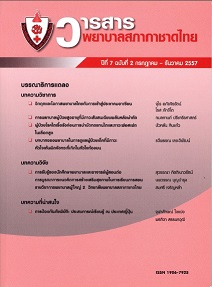ผู้ป่วยโรคไตเรื้อรังก่อนการบำบัดทดแทนไตและภาวะฟอสเฟตในเลือดสูง
Keywords:
โรคไตเรื้อรังก่อนการบำบัดทดแทนไต, ภาวะฟอสเฟตในเลือดสูง, pre-dialysis patients, hyperphosphatemiaAbstract
โรคไตเรื้อรัง (Chronic Kidney Disease: CKD) มีอุบัติการณ์ในการเกิดโรคสูงขึ้น และเป็นปัญหาทางสาธารณสุขทั่วโลกรวมทั้งประเทศไทย กลุ่มผู้ป่วยส่วนใหญ่อยู่ในระยะก่อนการบำบัดทดแทนไต มีระยะการดำเนินโรคที่ยาวนาน เมื่อไตเสื่อมหน้าที่ลงทำให้เกิดภาวะฟอสเฟตในเลือดสูง ทำให้เกิดภาวะแทรกซ้อนตามมาโดยเฉพาะโรคหัวใจและหลอดเลือด ทำให้ผู้ป่วยเสียชีวิตก่อนกำหนด การรักษาในระยะนี้สามารถทำได้โดยการรับประทานอาหารที่มีฟอสเฟตต่ำและการรับประทานยาจับฟอสเฟต พยาบาลมีบทบาทสำคัญในการดูแล ให้คำแนะนำ เพื่อให้ผู้ป่วยสามารถปฏิบัติตนได้อย่างเหมาะสม เพื่อชะลอความเสื่อมของไตและลดความเสี่ยงต่อการเกิดโรคหัวใจและหลอดเลือด เพื่อช่วยให้ผู้ป่วยดำรงชีวิตได้อย่างมีความสุข
Pre-dialysis patients and hyperphosphatemia
The frequency and severity of chronic kidney disease (CKD) is a problem which has continued to increase. The statistics of patients with chronic kidney disease, both in Thailand and abroad, are high accompanied by an increased mortality. Most patients are pre-dialysis and suffer from chronic kidney disease from the beginning of the disease right up to the last phase in which they can’t live without dialysis, which is the longest period of the prognosis. This causes a decrease in the loss of kidney function though hyperphosphatemia arises. The evidence correlates with cardiovascular disease and an increased risk of mortality and morbidity in patients. The goals of treatment are dietary phosphate restrictions and phosphate binding agents.
Nurses can play a role in managing hyperphosphatemia to slow down the degeneration of the kidneys and reduce the risk of cardiovascular disease. This therefore helps patients live happily.
Downloads
Issue
Section
License
เนื้อหาบทความหรือข้อคิดเห็นต่างๆ ในวารสารพยาบาลสภากาชาดไทยนี้ เป็นความคิดเห็นของผู้เขียนบทความ ไม่ใช่ความเห็นของกองบรรณาธิการ หรือสถาบันการพยาบาลศรีสวรินทิรา สภากาชาดไทย






